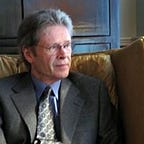Paradoxically Speaking
Interviewer: Can you explain jazz?
Yogi: I can’t, but I will. 90% of all jazz is half improvisation. The other half is the part people play while others are playing something they never played with anyone who played that part. So if you play the wrong part, its right. If you play the right part, it might be right if you play it wrong enough. But if you play it too right, it’s wrong.
Interviewer: I don’t understand.
Yogi: Anyone who understands jazz knows that you can’t understand it. It’s too complicated. That’s what’s so simple about it.
Interviewer: Do you understand it?
Yogi: No. That’s why I can explain it. If I understood it, I wouldn’t know anything about it….
— Yogi Berra explains Jazz.
*
I’m hunting for the truth.
It might be a kind of poetic
truth, and not just a factual one,
because behind everything
that happens to you, there
is another truth, a secret life.
~Anne Sexton
*
“As a Zuni elder focuses her eyes upon a cactus and abruptly hears the cactus begin to speak, so we focus our eyes upon these printed marks and immediately hear voices. We hear spoken words, witness strange scenes or visions, even experience other lives.
Only as our senses transfer their animating magic to the written word do the trees become mute, the other animals fall dumb.”
~ David Abram, The spell of the sensuous
*
“There is ultimately only one thing that makes human beings deeply and profoundly bitter, and that is to have thrust upon them a life without meaning.
~Laurens van der Post
I don’t know about you but I can’t live without meaning, which for me translates to love in some form. Love for a person, love for beauty, love of creation, love for a work, for ideas, for a garden, a tree, a pet even. I also recognized a love for sounds quite young, the sounds of language, the spoken word, of music and nature, of thoughts and emotions well articulated.
I learned to read at age six or seven, which separated the sounds of ideas from the sounds of nature. They seemed to come from different places, but they coexistenced in me. I learned to give more weight to ideas and language because I was educated that way. Delight in sounds in themselves was another world, their meaning somehow embodied in their character and quality.
It’s hard to explain in words. I don’t have Yogi Berta’s talent for communicating paradox.
Once, coming out of a talk by Krishnamurti, I didn’t realize I had slipped into a meditative state. I was able to perceive the obvious, that nature flows in waves of intense playful delight right under our noses. Our habitual “normal” parameters of consciousness exclude any awareness of the play of Creation and how it is enjoying itself. The meaning is in the playing. It’s having a hell of a good time conjuring “reality.”
Language has a hard time expressing this state of affairs. Poetry approaches it but logic can’t touch it. The arts all try to communicate something ineffable. That’s why we need them. It’s true that we can’t live by bread alone, but finding the exit door from our literal mindset is rare. The arts, meditation, Sufi dancing, psychedelic drugs, ayahuasca, all attempt to transport us to a broader, non logical consciousness where we can see “Reality.”
It’s debatable what we actually perceive in altered states of consciousness, but we seem to feel trapped in our small purview in spite of ourselves. Our societies demand it. We’re required to buckle down and get serious about our little lives, lives that are strangely empty of meaning. If we can’t find that meaning, we drown our sorrows in distractions, possessions and fleeting pleasures.
There is little meaning and big meaning. I think we all need big meaning more than we realize.
